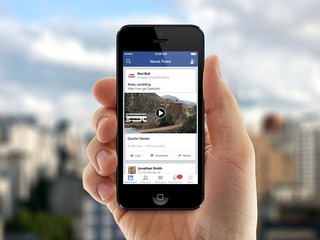DUOS expands AI capabilities to help seniors apply for assistance programs
It will complete and submit forms, and integrate with state benefit systems
Read more...
For a lot of companies, video is becoming a bigger and bigger part of their current roadmap, especially in social media. Facebook, Twitter and Snapchat have made it an integral part of their futures.
Maybe they should slow down a bit, though, because younger people may not be as into video as you might have thought, at least not when it comes to getting their news.
A survey out from Pew Research Center on Friday found that young people were actually the group that least preferred to get their news by watching it, and the group who actually preferred to read.
When surveyed, only 38 percent of those aged 18 to 29 said they preferred to watch their news. In fact, it's was the oldest age group, those aged 65 and up, who said they most prefer video, with over half getting their news this way.
The inverse is then true when it comes to reading, as 42 percent of young people said they prefer to read the news, and only a little more than a quarter of older people want to consume their news this way
The lines seem to be split at the age of 50; those younger want to read, now watch, while those older want to watch, not read.
Oh, and pretty much nobody from any age group wants to listen to the news. Sorry, radio!
These results would seems to go against the conventional wisdom that younger people have shorter attention spans, and that the best way to reach them is through attention-grabbing video.
As someone who was, until very recently, part of that youngest age group, I am among that wants to read the news, not watch it, simply for the time factor: watching a video means dedicating whatever the length of that video is to getting my information, be it 30 seconds or 30 minutes. When I have a written article in front of me, I can more easily scan it for the information I need, or that I'm interested in, and be done quickly. Plus, video can be choppy, and it can be annoying, especially if I'm forced to sit through ads before it starts. It's more of a hassle and it takes more of my attention.

Even though younger people may want to read more than you might suspect, that doesn't mean things aren't changing rapidly for the medium.
Of those young people who want to read the enws, only 10 percent are getting it from newspapers, while the rest are reading article online. With older people, 63 percent of those reading are still getting a newspaper, and only 20 percent are online. The future of journalism is clearly going to be entirely online.
So, newspapers are all going digital, but the same cannot be said for video news, as every age group still prefers video on their television over their computer.
That includes 57 percent of 18- to 29-year-old news watchers who prefer a TV, compared to 37 who watch online. While that's still more than any other age group, including double the percentage of 30- to 49-year-old news watchers, it isn't anywhere near the percentage of news readers.
When it comes to older people, the computer might as well not even exist for news videos, as only three percent consume this way.
Ultimately, even though younger people demonstrate less interest in the news overall, with only 27 percent saying they follow the news, compared to 77 percent of those over 65, "in the digital realm, they often get news at equal or higher rates than older Americans, whether intentionally or not."
So should companies reverse their strategies when it comes to video? No, of course not. It's still only a four percent difference between young people who want to read, versus those who want to watch. It's more that there's less of a gulf than you might expect, so maybe the focus should also be on giving its users interesting things to read as well.
(Image source: iroy.in)
It will complete and submit forms, and integrate with state benefit systems
Read more...The bill would require a report on how these industries use AI to valuate homes and underwrite loans
Read more...The artists wrote an open letter accusing OpenAI of misleading and using them
Read more...

